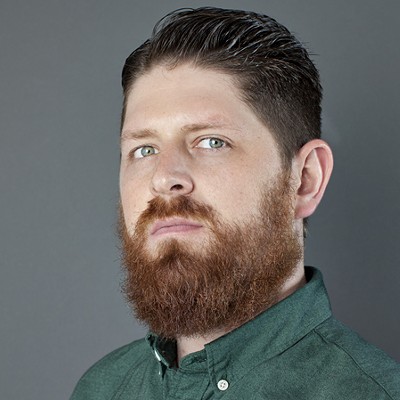A couple of months ago, British electro-indie-art-rock-retro-pop guy Dan Black made his first trip to Miami to play Dirty Hairy at LIV. (Check out a video here.) That night, he sat down with the New Times to talk about emerging music genres, ex-bandmates, copyright squabbles with the bride of B.I.G., and his polite plan to conquer America.
Tomorrow, Black returns to Sin City for the first day of the Ultra Music Festival. He'll play the main stage alongside fellow so-called wonky popper Little Boots as well as Passion Pit, Miss Nine, and Groove Armada -- not to mention Friday night headliners Tiësto and David Guetta.
New Times: Certain people describe you as wonky pop. Do you identify at all with that mini-movement?
Dan Black: Yes and no. On the one hand, people just go around making music and other people come along and go, "OK, let's put a line between these guys and these guys and put them together." It's kind of illusory, not really true. But at the same time, the word pop and the word wonky ... It'd be a bit churlish of me to go, "Oh, I'm nothing like that." In terms of a movement, though, Wonky Pop is a club in London. I mean, I've played it. Other people have played it. But if you look at all everyone who's played there, it's really diverse.
Yeah. It seems a bit of a stretch to label wonky pop a genre. But it seems that elements of the media are attempting to do so?
Imagine that ... People in the media trying to label stuff. Who'd have thought?
Before the more recent solo work, you were in the Servant. How did that band differ from your new stuff?
When it started, it was actually just me on my own like I am now, in a bedroom with a computer. But I was a lot younger, clueless about how to make the computer do what I wanted, and I didn't have much to say. It was much more wonky than pop, for want of better words. Then, some guys helped me play live and I'd always liked the idea of being in the classic four-piece band. You know, men against the world. I loved things like the Smiths and the Stone Roses. I sort of let it become that and it turned into a more traditional-sounding post-punk poppy thing. We did an album like that, but I was kind of underwhelmed, so I dissolved the band.
Were you the primary songwriter in that band?
I was the only songwriter in that band.
So the breakup was mostly influenced by your personal need to evolve as an artist.
Yes. But also it was partly influenced by the fact that I got tired of them. It was a quite typical band to be in toward the end. And I got tired of going, "Let's try this!" And people going, "Oh, I don't like that. I don't wanna do that." "OK ... So what should we do?" "Well, I don't know." It was just four people going in completely different directions.
"HYPNTZ," your Biggie-Rihanna mash-up is an interesting experiment. Has hip-hip actually impacted the way you make music?
Massively. In terms of how hip-hop music's built on samples and built on putting things that don't logically work together. How hip-hop ignores the rules. The way the flow of lyrics locks into the beat and makes you hear the music differently. A lot of hip-hop songs are like a three-leg table. And if you take a leg away, the song doesn't work. Most pop songs, you could probably take parts away and it'd still work. Or you could do them on an acoustic guitar. But hip-hop's got this thing about being a total sum of its parts. I mean, obviously I'm a white, English, middleclass guy who's a million miles from the classic hip-hop artist growing up in poor, black America, but I've been amazingly drawn to it. Hip-hop's arguably the most important music of the last 20 years, really.
How did "HYPNTZ" evolve into "Symphonies"?
My record company in the UK attempted to release the song. And Mrs. Wallace [Faith Evans], the Notorious B.I.G. estate controller ... I don't know if it was her personally. But the song was vetoed. I just know that they have a blanket "No" on any exploitation of his stuff. You know, he's dead and they want to protect his estate ... I kind of understand.
But we thought it was all fine, because the song is a mix of soundtracks and the Rihanna beat and we thought the one thing that wouldn't be a problem would be the Biggie lyrics. It's a cover in a way. And normally with covers, you don't need approval. But because I'd added melodies to it, that meant it was an interpolation, which meant they had the right to veto it, so they vetoed it. The night before a video shoot, they said no.
So, in that situation, I was like, "Well, I'm not gonna let this fucking beat me. I made this music and I like this music." And I decided to go away and write new lyrics, my own lyrics. It's sort of lyrically about that situation. You know, "What the fuck do I have to do to have my moment?"
You're playing the Ultra fest. How do you feel about festivals versus club shows?
I really like them both. The good thing about festivals is a lot of people don't know who you are and I like the challenge of playing to people and trying to win them over. Also, festival crowds are like, "I paid my money. I want a good time." Sometimes in clubs, people can be like, "Uh, why's this band here?"
Beyond Ultra, what's next?
I'm starting from zero in America, really. So, I've gotta do the last year again. Just starting over and going, "Hey, this is me."











